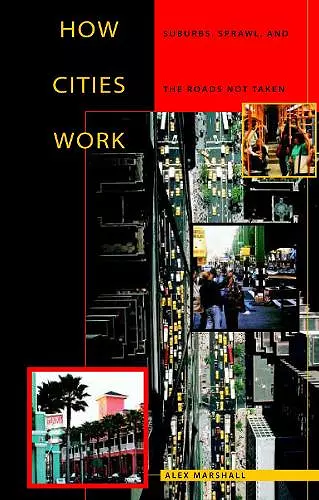How Cities Work
Suburbs, Sprawl, and the Roads Not Taken
Format:Paperback
Publisher:University of Texas Press
Published:1st Jan '01
Should be back in stock very soon

"This is an outstanding book that I hope and expect will make a major contribution to the current debate on cities and suburbs." -- Robert Fishman, author of American Planning Tradition: Culture and Policy and Bourgeois Utopias: The Rise and Fall of Suburbia
A hard-hitting, highly readable look at what makes cities work -- or not work.
Do cities work anymore? How did they get to be such sprawling conglomerations of lookalike subdivisions, megafreeways, and "big box" superstores surrounded by acres of parking lots? And why, most of all, don't they feel like real communities? These are the questions that Alex Marshall tackles in this hard-hitting, highly readable look at what makes cities work.
Marshall argues that urban life has broken down because of our basic ignorance of the real forces that shape cities—transportation systems, industry and business, and political decision making. He explores how these forces have built four very different urban environments—the decentralized sprawl of California's Silicon Valley, the crowded streets of New York City's Jackson Heights neighborhood, the controlled growth of Portland, Oregon, and the stage-set facades of Disney's planned community, Celebration, Florida.
To build better cities, Marshall asserts, we must understand and intelligently direct the forces that shape them. Without prescribing any one solution, he defines the key issues facing all concerned citizens who are trying to control urban sprawl and build real communities. His timely book will be important reading for a wide public and professional audience.
"Concern with traffic, environmental indifference and careless land development patterns, indeed, growing awareness of the many consequences of sprawl has led to calls for 'smart growth.' One of the smartest ways to prepare to effectuate smarter growth is to read How Cities Work. In a gentle but lucid and persuasive way Alex Marshall reminds us that the responsibility for making and maintaining good communities is a public one--that city-building is a public art dependent on public leadership, not acquiescence to private caprice. Anyone interested in helping to sustain rather than complain about the loss of community must read this book." --Alex Krieger, Chair, Department of Urban Planning and Design, Harvard Graduate School of Design "This is an outstanding book that I hope and expect will make a major contribution to the current debate on cities and suburbs." --Robert Fishman, author of American Planning Tradition: Culture and Policy and Bourgeois Utopias: The Rise and Fall of Suburbia " ... rich in evocative metaphors ... written in a lively style"--Geography, January 2002 "How Cities Work is an engaging read, containing important messages relevant not only to those in the urban design profession, but also to the wider public who have a role in deciding how cities should be shaped."--Journal of Urban Design, Vol. 7 No. 3, 2002
ISBN: 9780292752405
Dimensions: 235mm x 152mm x 18mm
Weight: 454g
272 pages